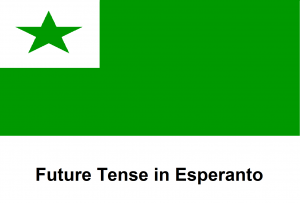Difference between revisions of "Language/Esperanto/Grammar/Future-Tense"
Jump to navigation
Jump to search
(Future Tense in Esperanto) |
|||
| Line 1: | Line 1: | ||
[[File:Future Tense in Esperanto.png|alt=Future Tense in Esperanto|thumb|Future Tense in Esperanto]] | |||
. | |||
*I will eat an egg - Mi manĝos ovon. | Hello everybody, | ||
In today's lesson you will learn some useful vocabulary about '''¨FUTURE TENSE¨''' in Esperanto. | |||
Feel free to edit this page by adding new words and expressions ! | |||
Good learning ! :) | |||
. | |||
. | |||
. | |||
== '''Some explanation for Future tense in Esperanto''' == | |||
'''<big>OBS.: In the infinitive form; change the last letter (-i) by (-os) to form the Future Tense</big>''' | |||
{| class="wikitable sortable" | |||
!<big>'''ENGLISH'''</big> | |||
!<big>'''PRONUNCIATION'''</big> | |||
'''<big>ENGLISH</big>''' | |||
!'''<big>ESPERANTO</big>''' | |||
!'''<big>PRONUNCIATION</big>''' | |||
'''<big>BRAZILIAN</big>''' | |||
'''<big>PORTUGUESE</big>''' | |||
!'''<big>BRAZILIAN</big>''' | |||
'''<big>PORTUGUESE</big>''' | |||
|- | |||
| | |||
| | |||
| | |||
| | |||
| | |||
|- | |||
|to have | |||
|'''''hah vih''''' | |||
|'''<big>havi</big>''' | |||
| | |||
|ter | |||
|- | |||
| | |||
| | |||
| | |||
| | |||
| | |||
|- | |||
|I will have | |||
|'''''mih hah vohs''''' | |||
|'''<big>Mi havos</big>''' | |||
|'''''mi Ha vos''''' | |||
|Eu terei | |||
|- | |||
|You will have | |||
|'''''vih hah vohs''''' | |||
|'''<big>Vi havos</big>''' | |||
|'''''vi Ha vos''''' | |||
|Você terá | |||
|- | |||
|He will have | |||
|'''''lih hah vohs''''' | |||
|'''<big>Li havos</big>''' | |||
|'''''li Ha vos''''' | |||
|Ele terá | |||
|- | |||
|She will have | |||
|'''''shih hah vohs''''' | |||
|'''<big>Ŝi havos</big>''' | |||
|'''''chi Ha vos''''' | |||
|Ela terá | |||
|- | |||
|We will have | |||
|'''''nih hah vohs''''' | |||
|'''<big>Ni havos</big>''' | |||
|'''''ni Ha vos''''' | |||
|Nós teremos | |||
|- | |||
|You will have | |||
|'''''vih hah vohs''''' | |||
|'''<big>Vi havos</big>''' | |||
|'''''vi Ha vos''''' | |||
|Vocês terão | |||
|- | |||
|They will have | |||
|'''''ih lih hah vohs''''' | |||
|'''<big>Ili havos</big>''' | |||
|'''''ili Ha vos''''' | |||
|Eles terão | |||
|- | |||
| | |||
| | |||
| | |||
| | |||
| | |||
|- | |||
|I will come | |||
|'''''mih veh nohs''''' | |||
|'''<big>Mi venos</big>''' | |||
|'''''mi ve nos''''' | |||
|Eu virei | |||
|- | |||
|I will eat an egg | |||
|'''''mih mahn johs oh vohn''''' | |||
|'''<big>Mi manĝos ovon</big>''' | |||
|'''''mi man djos o von''''' | |||
|Eu comerei um ovo | |||
|} | |||
=== '''In Esperanto, expressing future tense is changing the "-i" (infinitive) of a verb to "-os".''' === | |||
*'''I will come. - Mi venos.''' | |||
*'''I will eat an egg - Mi manĝos ovon.''' | |||
Revision as of 07:08, 10 April 2020
.
Hello everybody,
In today's lesson you will learn some useful vocabulary about ¨FUTURE TENSE¨ in Esperanto.
Feel free to edit this page by adding new words and expressions !
Good learning ! :)
.
.
.
Some explanation for Future tense in Esperanto
OBS.: In the infinitive form; change the last letter (-i) by (-os) to form the Future Tense
| ENGLISH | PRONUNCIATION
ENGLISH |
ESPERANTO | PRONUNCIATION
BRAZILIAN PORTUGUESE |
BRAZILIAN
PORTUGUESE |
|---|---|---|---|---|
| to have | hah vih | havi | ter | |
| I will have | mih hah vohs | Mi havos | mi Ha vos | Eu terei |
| You will have | vih hah vohs | Vi havos | vi Ha vos | Você terá |
| He will have | lih hah vohs | Li havos | li Ha vos | Ele terá |
| She will have | shih hah vohs | Ŝi havos | chi Ha vos | Ela terá |
| We will have | nih hah vohs | Ni havos | ni Ha vos | Nós teremos |
| You will have | vih hah vohs | Vi havos | vi Ha vos | Vocês terão |
| They will have | ih lih hah vohs | Ili havos | ili Ha vos | Eles terão |
| I will come | mih veh nohs | Mi venos | mi ve nos | Eu virei |
| I will eat an egg | mih mahn johs oh vohn | Mi manĝos ovon | mi man djos o von | Eu comerei um ovo |
In Esperanto, expressing future tense is changing the "-i" (infinitive) of a verb to "-os".
- I will come. - Mi venos.
- I will eat an egg - Mi manĝos ovon.
